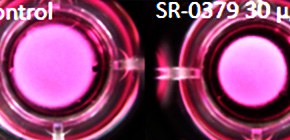
Successful optimization of novel peptide in development of wound and refractory cutaneous ulcer treatment
Exhibits wound healing effects and antibacterial activity
A joint group of researchers from Osaka University and AnGes MG , Inc . developed a new cationic antimicrobial peptide AG30/5C. In order to stabilize the peptide and cut the manufacturing cost of AG30/5C, this group made further efforts in modification by examining its metabolites. The group succeeded in producing an optimized compound SR-0379, a new more stable shorter peptide containing 20 amino acids, that exhibited wound healing effects and antibacterial activity. SR-0379 assists wound healing effects by accelerating angiogenesis and granulation tissue formation plus antibacterial action through an alteration of permeability. In experiments with rats, SR-0379 showed wound repair efficacy equivalent to that of existing therapeutic agent Trafermin (Fiblast Spray), and antibacterial activity against drug resistant bacteria such as methicillin-resistant Staphylococcus aureu (MRSA) .
Possessing both wound healing and antibacterial activity properties, SR-0379 is expected to become a new agent in the treatment of patients with refractory cutaneous ulcers whose defense mechanisms against infection have been damaged. This group's research was conducted under grants for Early-stage & Exploratory Clinical Trials from the Health, Labour, and Welfare Ministry. Doctor-initiated clinical trials are scheduled.
Osaka University personnel involved in this research:
MORISHITA Ryuichi , Endowed Chair Professor, Department of Clinical Gene Therapy, Graduate School of Medicine
TOMIOKA Hideki , 3rd year student in OU doctoral program
NAKAGAMI Hironori , Endowed Chair Professor, United Graduate School of Child Development
KANEDA Yasufumi , Professor, Graduate School of Medicine
Abstract
We developed a novel cationic antimicrobial peptide, AG30/5C, which demonstrates angiogenic properties similar to those of LL-37 or PR39. However, improvement of its stability and cost efficacy are required for clinical application. Therefore, we examined the metabolites of AG30/5C, which provided the further optimized compound, SR-0379. SR-0379 enhanced the proliferation of human dermal fibroblast cells (NHDFs) via the PI3 kinase-Akt-mTOR pathway through integrin-mediated interactions. Furthermore SR-0379 promoted the tube formation of human umbilical vein endothelial cells (HUVECs) in co-culture with NHDFs. This compound also displays antimicrobial activities against a number of bacteria, including drug-resistant microbes and fungi. We evaluated the effect of SR-0379 in two different wound-healing models in rats, the full-thickness defects under a diabetic condition and an acutely infected wound with full-thickness defects and inoculation with Staphylococcus aureus. Treatment with SR-0379 significantly accelerated wound healing when compared to fibroblast growth factor 2 (FGF2). The beneficial effects of SR-0379 on wound healing can be explained by enhanced angiogenesis, granulation tissue formation, proliferation of endothelial cells and fibroblasts and antimicrobial activity. These results indicate that SR-0379 may have the potential for drug development in wound repair, even under especially critical colonization conditions.

To learn more about this research, please read the full research report entitled " Novel Anti-Microbial Peptide SR-0379 Accelerates Wound Healing via the PI3 Kinase/Akt/mTOR Pathway " at this page of the PLOS ONE website.
Related link :
